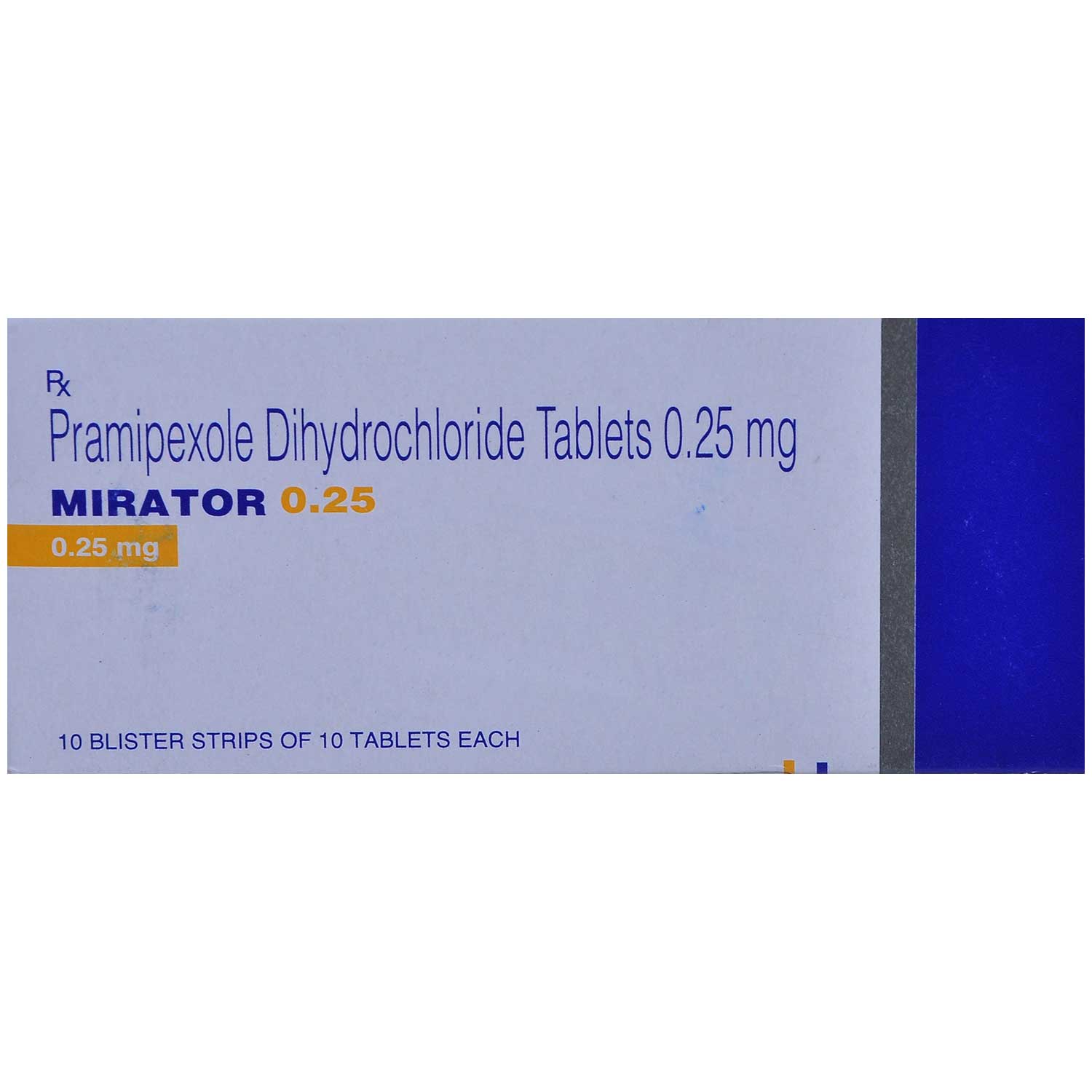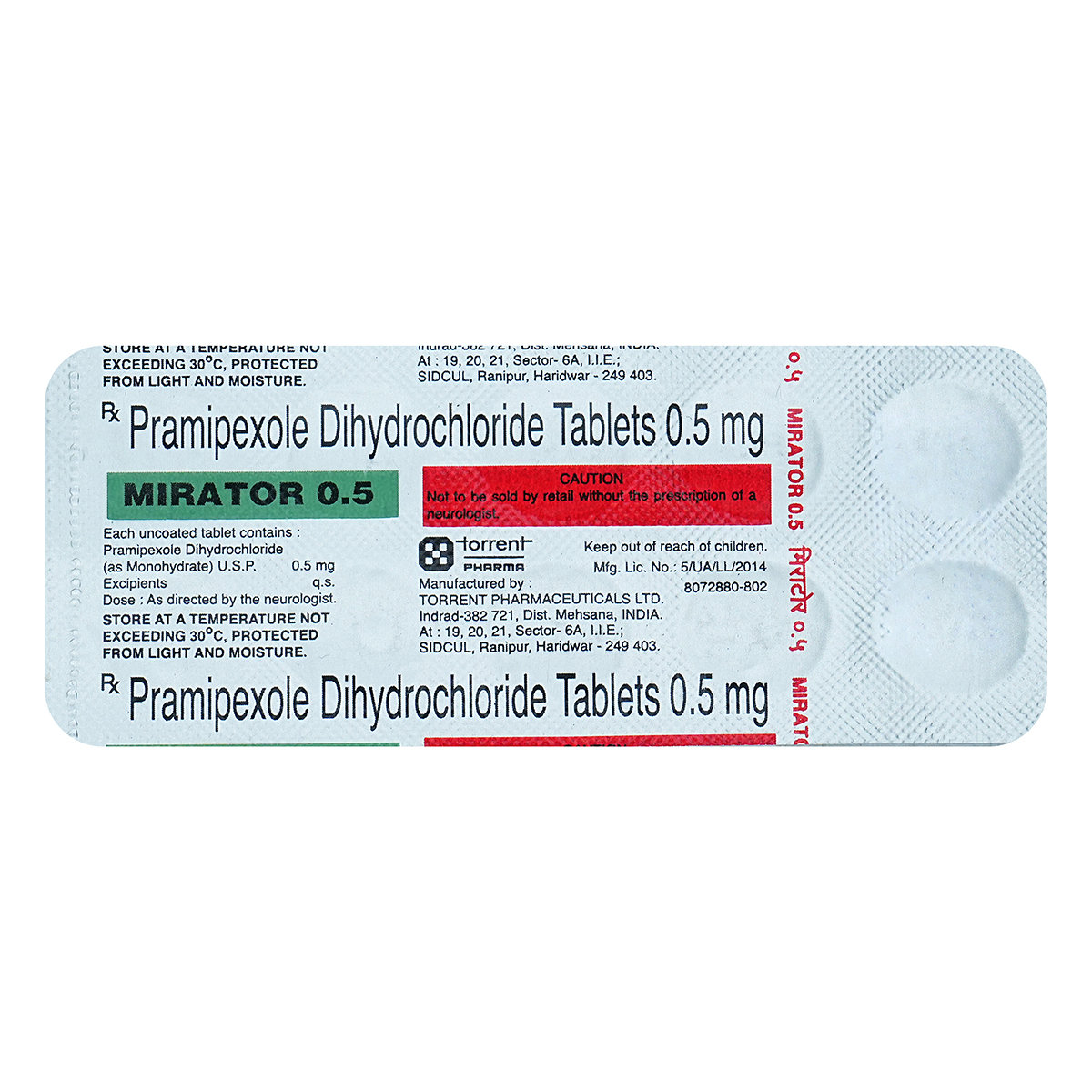Pramipexole
About Pramipexole
Pramipexole belongs to a group of antiparkinson agents or dopamine agonists used to treat the symptoms of Parkinson’s disease and moderate to severe Willis-Ekbom disease (restless legs syndrome) in adults. Parkinson’s disease is a progressive neurological disorder in which the first signs are problems with movements. Willis-Ekbom disease is a condition which causes the uncontrollable urge to move the legs.
Pramipexole contains 'Pramipexole' that works by mimicking the action of dopamine (acting in place of dopamine), a natural substance found in the brain needed to control body movement. This triggers the nerve impulses in the brain that control body movements.
In some cases, you may experience certain common side-effects such as sleepiness, nausea, constipation, dizziness, fatigue, hallucinations, dry mouth, muscle spasms, and peripheral oedema (leg swelling due to fluid overload). Most of these side-effects do not require medical attention and will resolve gradually over time. However, you are advised to talk to your doctor if you experience these side-effects persistently.
Do not discontinue Pramipexole on your own. Consult your doctor if you are pregnant or breastfeeding. Pramipexole may cause drowsiness and dizziness, do not drive unless you are alert. Pramipexole should not be used in children below 18 years. Avoid consuming alcohol along with Pramipexole as it could lead to increased drowsiness and dizziness. Rise slowly from sitting or lying position as Pramipexole may cause orthostatic hypotension (sudden lowering in blood pressure leading to dizziness on standing).
Uses of Pramipexole
Medicinal Benefits
Pramipexole belongs to a group of antiparkinson agents called dopamine agonists used to treat the symptoms of Parkinson’s disease and moderate to severe Willis-Ekbom disease (restless legs syndrome) in adults. Pramipexole binds to the dopamine receptor and mimics its action. Dopamine is a naturally-occurring neurotransmitter in the brain. Dopamine is absent or reduced in people with Parkinson’s disease. Pramipexole works by stimulating the dopamine receptors in the brain. This triggers the nerve impulses in the brain that control body movements. Pramipexole helps in relieving the symptoms of Parkinson’s disease, such as muscle spasms, tremors, stiffness, and poor muscle control.
Directions for Use
Storage
Side Effects of Pramipexole
- Nausea
- Low blood pressure
- Dizziness
- Constipation
- Fatigue
- Headache
- Dry mouth
- Muscle spasms
Drug Warnings
Do not take Pramipexole if you are allergic to any of its contents. Talk to your doctor before taking Pramipexole if you have kidney problems, hallucinations, dyskinesia (abnormal limb movements), dystonia (inability to keep the neck straight), sleepiness or suddenly falling asleep, psychosis, vision impairment, severe heart or blood vessel disease, or augmentation (symptoms start earlier). Inform your doctor if you experience symptoms such as apathy, anxiety, depression, fatigue, sweating or pain after dose reduction or stopping Pramipexole. Pramipexole may cause intense urges such as increased sex drive, gambling, overeating and wasting money. Consult your doctor if you are pregnant or breastfeeding. Pramipexole may cause drowsiness and dizziness, do not drive unless you are alert. Pramipexole should not be given to children below 18 years. Avoid consuming alcohol along with Pramipexole as it could lead to increased drowsiness and dizziness. Rise slowly from sitting or lying position as Pramipexole causes orthostatic hypotension (sudden lowering in blood pressure leading to dizziness on standing).
Drug Interactions
Drug-Drug Interactions: Pramipexole may interact with anti-depressants (amitriptyline, duloxetine, trazodone, and fluoxetine), antihistamine (diphenhydramine, and cetirizine), anticonvulsants (gabapentin, and pregabalin), a drug used to treat Alzheimer’s (memantine), and pain killers (acetaminophen, hydrocodone, tramadol).
Drug-Food Interactions: No interactions found/established.
Drug-Disease Interactions: Inform your doctor if you have disease conditions such as low blood pressure, neuroleptic malignant syndrome, psychosis, and renal function disorders.
Drug-Drug Interactions Checker List:
Safety Advice

Alcohol
unsafeAvoid consumption of alcohol while taking Pramipexole as it may cause increased dizziness.

Pregnancy
cautionPlease consult your doctor if you have any concerns regarding this; your doctor will prescribe only if the benefits outweigh the risks.

Breast Feeding
unsafeDo not take Pramipexole if you are breastfeeding. Pramipexole may reduce the production of breast milk. Also, it can pass into breast milk. If taking Pramipexole is unavoidable, stop breastfeeding.

Driving
unsafePramipexole may cause dizziness, sleepiness and hallucinations. Avoid driving and handling machinery if you experience these symptoms.

Liver
cautionDose adjustment may be needed in patients with liver impairment. Please consult your doctor if you have a liver impairment or any concerns regarding this.

Kidney
cautionDose adjustment may be needed in patients with kidney impairment. Please consult your doctor if you have kidney impairment or any concerns regarding this.

Children
unsafePramipexole is not recommended for use in children below 18years.
Habit Forming
Diet & Lifestyle Advise
- Maintain a healthy diet and exercise regularly.
- Include a diet rich in iron, folate and magnesium.
- Regularly attend therapy sessions.
- Perform meditation and yoga.
- Follow a regular sleep pattern.
- Avoid smoking and alcohol consumption.
- Learn about your condition, understand the risk factors and follow the doctor’s treatment plan.
Special Advise
Patients and their caretakers (midwife/nurse) should be alerted as Pramipexole may cause intense urges such as increased sex drive, gambling, overeating and wasting money.
Patients Concern
Disease/Condition Glossary
Parkinson’s disease: It is a progressive neurological disorder in which the first signs are problems with movements. Dopamine is a naturally-occurring neurotransmitter in the brain which is reduced or absent in people with Parkinson’s disease. Due to this problems arise with smooth and coordinated movements. Symptoms include decreased ability to smell, stooped posture, changes in voice, constipation, small/cramped handwriting, tremor, slow movements, stiffness of arms, legs, and trunk, and problems with balance.
Willis-Ekbom disease (restless leg syndrome): It is a condition which causes the uncontrollable urge to move the legs. The urge to move their legs is more intense when a person is trying to sleep or relax. This interferes with sleep leading to daytime sleepiness and fatigue. Symptoms include an uncontrollable urge to move the legs, tingling, crawling or pulling sensations in the legs.
FAQs
Pramipexole works by acting like dopamine and triggering the nerve impulses in the brain that controls our body movements like restless leg syndrome and Parkinson's.
Do not discontinue Pramipexole without consulting your doctor as it could lead to recurring symptoms. To treat your condition effectually, continue taking Pramipexole for as long as prescribed. Do not be reluctant to speak with your doctor if you feel any difficulty while taking Pramipexole.
Pramipexole may lower the blood pressure than normal leading to hypotension (low blood pressure), especially during the initial days of treatment. Do not stand up suddenly, rise slowly to avoid a sudden drop in blood pressure. Regularly monitor your blood pressure levels while taking Pramipexole.
Dry mouth could be a side-effect of Pramipexole. Limiting caffeine intake, avoiding smoking and mouthwashes containing alcohol, drinking water regularly, and chewing sugar-free gum/candy might help in stimulating saliva and thereby prevents drying of the mouth.
Pramipexole may cause peripheral oedema (swelling of lower legs and hands due to fluid overload). So, avoid sitting or standing for too long.
Hallucination is a medical condition in which the person may feel, hear or believe things that are not true, see things that are not there, feel unusually suspicious or confused. If you experience hallucinations, please talk to your doctor immediately.





